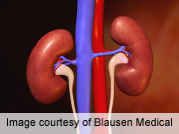November 18, 2014


Latest Sleep News
FRIDAY, Nov. 14, 2014 (HealthDay News) — Kidney disease may progress faster for diabetics who have kidney disease and also suffer from sleep apnea, according to a new study.
Screening for the sleep disorder, the researchers said, could help identify those at risk for accelerated loss of kidney function.
Obstructive sleep apnea is common among people with type 2 diabetes, according to the researchers. The disorder causes the upper airway to become blocked by soft tissue in the back of the throat during sleep. This causes pauses in breathing and other symptoms, such as gasping and snoring.
People with type 2 diabetes are also at greater risk for chronic kidney disease (CKD), according to background information from the study.
The researchers, led by Dr. Roberto Pisoni of the Medical University of South Carolina, investigated whether sleep apnea was linked to diabetes and the development of kidney disease.
Their study involved 56 people who had diabetes and kidney disease. The patients completed a questionnaire, which screened them for sleep apnea. The research showed that 61 percent of the patients had high scores on their sleep apnea screening survey. Those patients had much worse kidney function than others with low scores on sleep apnea.
“This study shows that a high-risk score for obstructive sleep apnea is common in non-dialysis CKD patients with diabetic nephropathy and is associated with more rapid loss of renal function,” the researchers wrote. “This simple approach identifies patients at higher risk of CKD progression.”
While researchers found an association between sleep apnea and reduced kidney function in diabetics, their study did not prove a cause-and-effect relationship.
The findings were expected to be presented Friday at the annual meeting of the American Society of Nephrology in Philadelphia. Research presented at scientific meetings should be viewed as preliminary until published in a peer-reviewed medical journal.
— Mary Elizabeth Dallas
 Copyright © 2014 HealthDay. All rights reserved.
Copyright © 2014 HealthDay. All rights reserved.
SOURCE: American Society of Nephrology, news release, Nov. 14, 2014
![]()